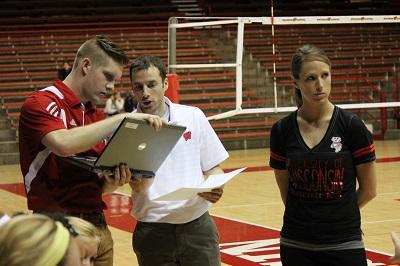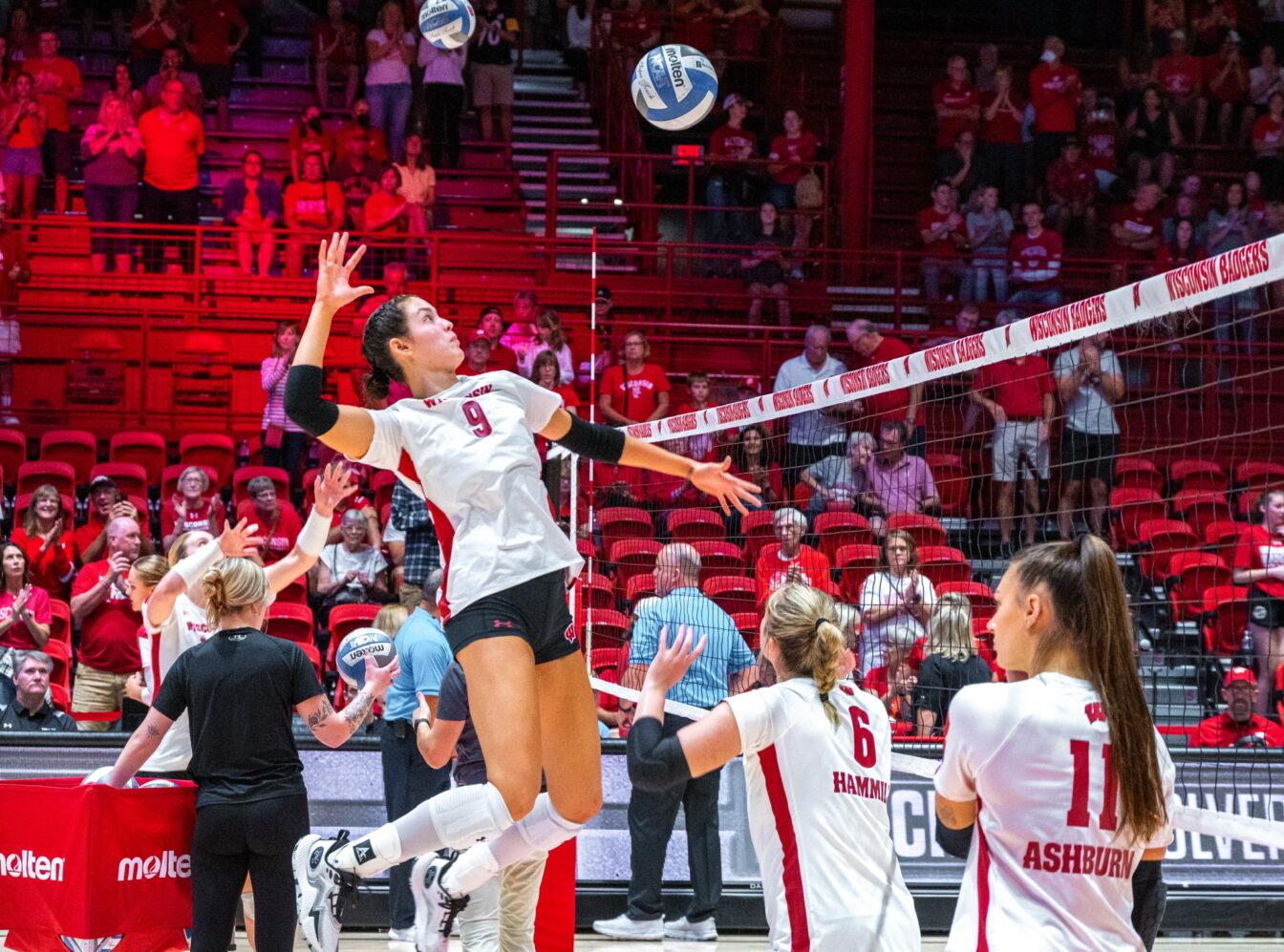When Wisconsin women’s volleyball head coach Kelly Sheffield went on a recruiting trip in the summer of 2010 to Virginia, he didn’t realize he was unearthing one of the most important finds of his career.
And it wasn’t even a player.
Instead, he found someone much more valuable: Gary White, the man who now sits next to Sheffield during matches and serves under him as a Wisconsin volleyball assistant coach.
“I just liked the way he went about things,” Sheffield said of the first time he saw White. “He had good energy and he was teaching and the girls were responding to him. Afterwards I just went up to him and told him, ‘Hey, I thought you did a really good job.'”
That prompted Sheffield to invite White to work at camps that summer in Dayton, where Sheffield was the head coach at the time. After White continued to impress Sheffield, he asked White if he ever considered getting into coaching.
White’s volleyball background began his freshman year of high school, where he played four years after his friends convinced him to try out. He pursued his Bachelor’s Degree at Penn State University, where he played two seasons of club volleyball and graduated in 2007.
After graduation, White moved to Washington, D.C. to work as an engineer at Lockheed Martin. It was in the nation’s capital where White met people who coached a club called Volleyball Elite in northern Virginia, which is where his path collided with Sheffield’s.
“I started to really enjoy doing the coaching side after college,” White said.
At first, White hesitated about leaving his job and declined the offer. Sheffield told him to let him know if he changed his mind.
A few months later, the two ran back into one another at the Final Four in Kansas City, Missouri. This time, White had come around and told Sheffield he wanted to get into coaching. As fate would have it, Sheffield’s staff at Dayton had a vacancy at the time.
The catch? It was a volunteer assistant position, which has an annual salary of $0.
“It was tough at first, because you’re adjusting to paying rent, electricity and all of that kind of stuff knowing you’re not gonna be making any money during the season,” White said.
In the summer, White worked at camps to maintain some degree of income, while dipping into his savings to cover the rest of his expenses.
“For me, it came down to, ‘What do I love to do?'” White said. “I love being in the gym, I love doing this stuff, you spend 20 hours a day doing it and you kinda just get lost in it. And you just keep doing it. You love what you’re doing. The time doesn’t matter, how much you’re making doesn’t matter.”
When Sheffield took the Wisconsin job in December 2012, he transplanted much of his staff from Dayton to Madison, including White. He was promoted from volunteer to assistant coach in addition to the move.
“[There are] not many people who even took the path I took, being able to find a volunteer then finding just an assistant job, then being able to have an assistant job in the Big Ten is just not usual,” White said. “To have Kelly trust me that way is huge.”
As a former engineer who specialized in information technology, it comes as little surprise that White spends a tremendous amount of time in the film room breaking down the team’s play and scouting upcoming opponents.
The process for White begins Sundays, when he receives the opposition’s film from the week prior. His first set is coding and quantifying every touch, whether it be a dig, set, spike or pass. Then, he breaks down the team’s tendencies and rotations.
“He works with our staff really well,” Sheffield said. “He’s got an analytical mind.”
Don’t disrupt White when he’s working though — something sophomore middle-blocker Haleigh Nelson has found out quickly.
“I have a 15-minute rule with Gary,” Nelson said. “Whenever I go up to the offices just to chat, I’m only allowed to be there for 15 minutes just because I distract him too much.”
In practice, he eases the team into the scouting report, giving them little to digest at first, then closely honing in on what the other team will try to do against them the day before the match.
“One of the great things about this group is they’re able to take the information we give them, and we give them more and more every week, and they just take it and apply it, and it really shows in our matches,” White said.
The process is time consuming and grueling.
“You spend probably the first 48 hours [of scouting a team] watching as much film as you can,” White said. “So Kelly and I will probably spend probably about 95 percent of the time we’re awake watching our opponent.
“Those first couple of days you don’t sleep a lot because you’re trying to break down as much as you can and see as much as you can.”
White is responsible for coordinating the blocking scheme for the Badgers, which involves positioning of the middle blockers and the alignment of the back-line defense.
“He is a huge component to our program,” senior middle-blocker Dominique Thompson said. “He literally almost sleeps here … Every game that we go into we feel comfortable, and we feel like we know what the other team is gonna do because Gary has spent a lot of time — all of the coaches have — preparing us.”
In less than two seasons, White has cultivated a special relationship with the blockers, including Thompson, Nelson and sophomore Tori Blake, that is serious in the gym but light off the court.
“Being able to have this seriousness when you’re in the gym and then when you’re off the court just being able to converse is something they enjoy,” White said. “It’s easy to send them a text message and just say, ‘Hey, how are things going?'”
The block’s performance has steadily improved as the 2014 season progresses. The Badgers entered last weekend ranked 123rd in total blocking, but out-blocked the top blocking team in the Big Ten, Minnesota, 9.0-5.0 Saturday night. In conference play, the Badgers average 2.80 blocks per set, which ranks third in Big Ten play.
White’s commitment to the team doesn’t go unnoticed by the coach who gave him his shot of pursuing his true passion.
“He drinks and sleeps Badger volleyball, and volleyball in general,” Sheffield said. “He’s always asking the right questions, he’s trying to figure out ways to get better. I think he’s really good with the players. I think he’s got a really good coaching demeanor and I think he’s always trying to find a way to make them better.”
And if you’re looking for him, just check the film room.










